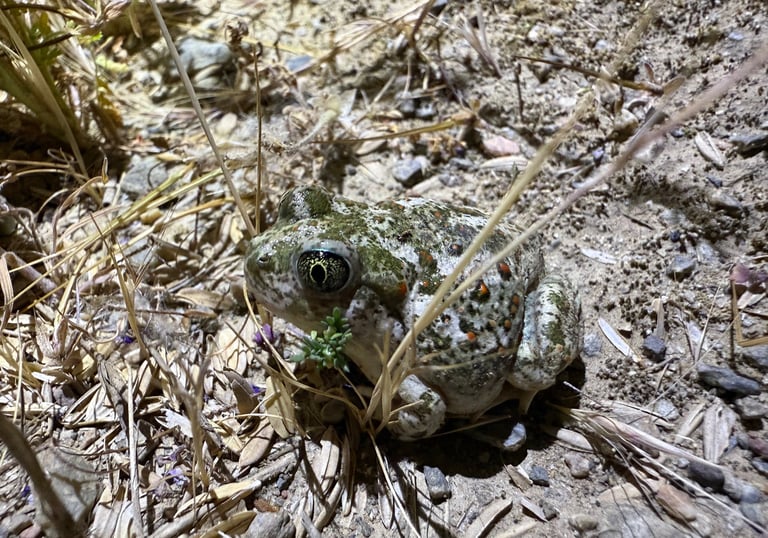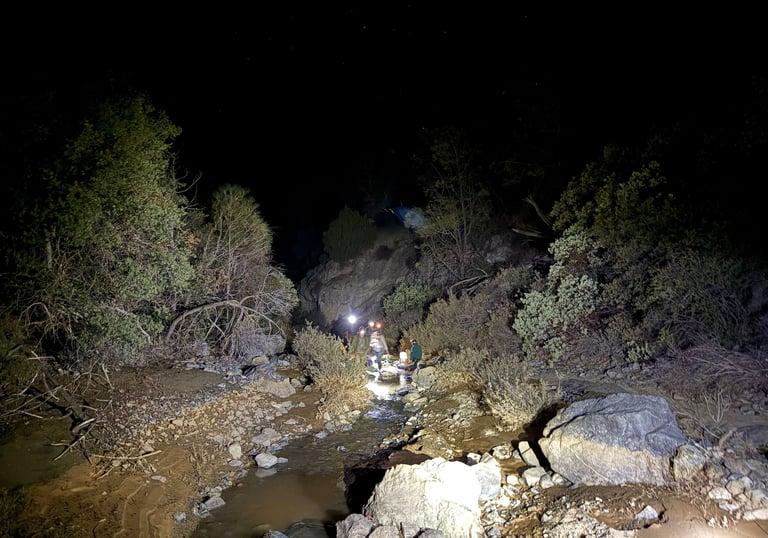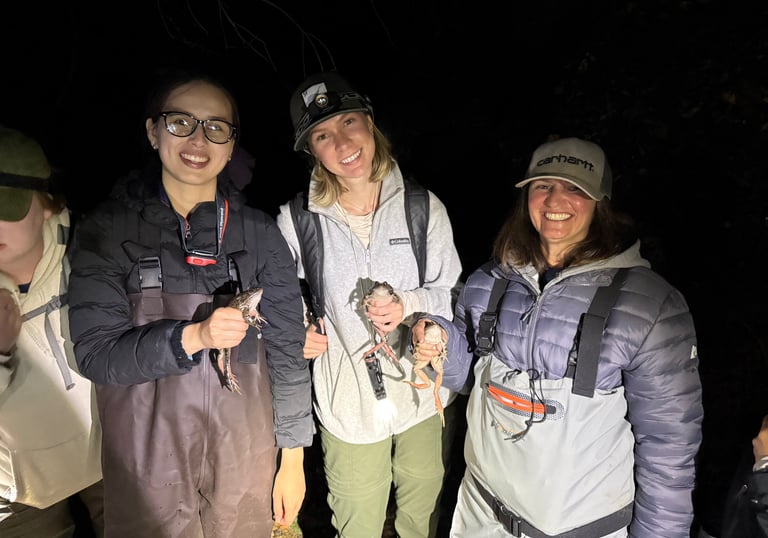Workshops
Hands-on wildlife workshops approved by State and federal agencies
Introductory level workshops
We offer Introductory level workshops for California red-legged frog, foothill yellow-legged frog, and pond turtle nesting behavior


Habitat focused workshops
We also offer a workshop on Rare Pond Species in California
Master level workshops typically require an introductory level workshop as a prerequisite, for foothill yellow-legged and California red-legged frogs.
Master level workshops




Workshops
For information: Workshops@thewildlifeproject.com
Upcoming, current, and recent workshops!
Introductory-level California Red-legged Frog workshop
(We are currently have a waiting list for July 2026)
This workshop will include a web-based lecture from Jeff Alvarez and Jeff Wilcox (co-leaders). It is designed to be an introductory workshop that will cover basic natural history and allow participants to gain new insight into this frog's behavior. A separate field component will include at least 4 hours of field time in occupied habitat where participants will be able to observe and handle California red-legged frogs.
Master-level California Red-legged Frog workshop
(Contact us to be placed on the list for 2026)
This is an on-going workshop (you can join any time-space allowed) and was developed to expose biologists to a large number of California red-legged frogs in at least 4 different counties in California. The workshop is field-based and requires participants to meet at 4 locations in the State over a 12-month period. Participants should expect to handle at least 20 frogs of various life stages and also observe California red-legged frog egg masses in the field with permitted biologists. This workshop has been approved by The Wildlife Society to receive 1 Continuing Education Unit (Category I) toward the Certified Wildlife Biologist® Program.
Master-level Foothill Yellow-legged frog workshop
(Contact us to be placed on the list for 2026)
This on-going workshop (you can join any time - space allowed) was developed to expose biologists to a large number of foothill yellow-legged frogs and their occupied habitat, in at least 3 different counties in California. The workshop will be field-based and will require participants to meet at 3 locations in the State over a 12-month period. Participants should expect to handle at least 20 frogs of various life stages, and also observe foothill yellow-legged frog egg masses in the field with permitted biologists.
Bullfrog control measures in California Red-legged Frog habitat
(We are currently accepting names for May 2026)
------includes an overnight, with dinner and breakfast included------
This is a hands-on techniques workshop that provides experience removing American bullfrogs from creeks and ponds. The workshop included discussions on permitting, pellet rifle selection and use, gig techniques, and use of a Hawaiian sling. Bullfrogs ARE removed during the workshop. Likely location: Santa Clara County, and Wind Wolves Preserve, Grapevine, California (for those in Southern California). Culled bullfrogs will be examined for stomach contents, parasites, and anatomical examination.
This workshop has been approved by The Wildlife Society to receive 1 Continuing Education Unit (Category I) toward the Certified Wildlife Biologist® Program.
Pond Turtle Nesting Workshop
(Contact us to be placed on the list for 2026)
The focus includes a lecture portion that discusses select aspects of the natural history of the species, as well as the regulatory context in which we find this species currently. Permits and permitting are discussed in detail. The field component includes all participants walking along occupied ponds at the Mt. View Sanitary District in Martinez, CA, where we will look for and hopefully find pond turtle nests, predated nests, incomplete nests, and nesting turtles. We will also discuss the futility of conducting nesting surveys in occupied areas.
Special-status Herps from California, in Baja California
(Click on this link to be added to the waiting list )
This is a field-oriented workshop that is designed to allow you to see, collect, and handle special-status herps from California, but we conduct it in Baja California. The workshop is offered as a partnership between The Wildlife Project and Conservación de Fauna del Noroeste (a non-profit supporting herps in Baja). The workshop leaders, both of whom are extremely accomplished herpetologists and great people, will guide you around to see dozens of species of wildlife, most of which are rare in California, but can be handled in Baja. California red-legged frogs, arroyo toads, two-striped garter snake, and many others are common and will be observed.
Accommodations are available at the Meling Ranch and range from camping to cabins. Food can be self-prepared or ordered from the kitchen (various Mexican and American dishes). For those that rarely or who have never travelled into Mexico, the group leaders meet in front of Costco in Ensenada and will guide you to the site. We will offer you hints on getting through the border (very easy), getting a tourist visa (very easy), renting a car from Avis (approved to take into Mexico) or taking your own car, or even car-pooling. This is a very safe and easy trip. In years passed we found: (*special-status) California Red-legged Frog*, Arroyo Toad*, Western Spadefoot*, Pacific Treefrog, California Treefrog, Western Toad, Black-tailed Brush Lizard, Coast Horned Lizard*, Legless Lizard*, Orange-throated Whiptail*, California Glossy Snake*, Red Diamond Rattlesnake*, Baja California Coachwhip*, Two-striped Garter Snake*, Granite Night Lizard, Baja California Spiny Lizard, and even California Condor*. We always have a really great group of attendees; this workshop should not be missed! This workshop is a fund-raiser for Fauno.
San Francisco Bay Area Amphibians (co-led by David Cook)
------ (COMPLETED for 2025 - Will be offered in Winter 2027) ------
The in-person lecture portion focuses on natural history, habitat associations, and microhabitat components of the amphibians of the San Francisco Bay Area. The field portion includes visiting habitats with species present, and finding, identifying, and photographing all of the specimens that we find. Classes generally fill fast, contact: The Laguna de Santa Rosa Foundation.
California Tiger Salamander Terrestrial Ecology workshop
(Completed for 2025, next workshop March 2026)
The focus is on the techniques used for terrestrial surveys for California tiger salamander. A pitfall fence and traps will be installed on site, with your participation. We'll also visit field sites with under-road tunnel crossings. Classes generally fill fast, so sign up early through The Laguna de Santa Rosa Foundation.
Rare Pond Species Survey Techniques Workshop
(Completed for 2025, next workshop March 2026)
The focus is on California tiger salamander, California red-legged frog, and northwestern and southwestern pond turtles; field component will include handling opportunities, and is approximately half the workshop; classes generally fill fast, so sign up early through The Laguna de Santa Rosa Foundation.
Introductory-level Foothill Yellow-legged Frog workshop
(Will be offered through the Laguna Foundation in Fall 2026)
Our focus includes a lecture portion that discusses select aspects of the natural history of the species, as well as the regulatory context in which we find this species currently. Permits and permitting are discussed. The field component includes all participants walking along an occupied creek where we find, collect, and handle numerous foothill yellow-legged frogs, as well as California giant salamander larvae. Sign up early through The Laguna de Santa Rosa Foundation.
Central Coast Special-status Herps
(Watch for this workshop in April 2026)
Lecture portion focuses on natural history, habitat associations, microhabitat components of each special-status amphibian and reptile in the central California coast region. The field portion is focused on visiting habitats with species present and finding, identifying, and photographing all of the specimens that we find. In years passed we have found: California red-legged frog (adults and larvae), Coast Range newt (and their eggs and larvae), Monterey ensatina, black-bellied slender salamander, Pacific chorus frog (or treefrog), southwestern pond turtle, western fence lizard, western skink, California kingsnake, and western terrestrial garter snake. This workshop has been co-led by experts in the field whose experience along the central coast is invaluable. We have had a really great group of attendees in previous years; you should catch the next one! Contact the Central Coast Chapter of The Wildlife Society to get on their workshops email list: cccctws@gmail.com. Hint: being a chapter member will help your chances of getting into this workshop.
Introduction to Western Spadefoot
(Completed for 2025 through The Western Section of The Wildlife Society next workshop April 2026)
This species-specific workshop focuses on Identification, habitat use, general ecology, and natural history. There is an online-based lecture and a field component. This introductory level workshop was held in Tracy, CA and we were able to see approximately 150 western spadefoot adults. Watch for the announcement from The Western Section of The Wildlife Society for another round of this popular workshop, or Contact Ivan Parr at workshops@tws-west.org.
New Master Level workshops being planned!
Master Level Western Spadefoot
This species-specific (two species) workshop will focus on habitat use, general ecology, and natural history. There will be a field component only. We hand capture, dip net, and do visual Encounter Surveys for Western Spadefoot, which we will measure, weigh, and evaluate sex and health, from individual western spadefoot across their range. It will include visiting sites in different parts of California to see each life stage of Western Spadefoot. Watch for it for 2026.
Master level Pond Turtle Management
This species-specific (two species) workshop will focus on habitat use, general ecology, and natural history. There will be a field component only for pond turtles in the intermixing zone of the two native species as well as their natural ranges. We plan to trap, age, process (measure, weigh, evaluate sex and health), both Southwestern Pond Turtle and the Northwestern Pond Turtle, as well as the presummed intergrade zone. It will include visiting sites in different parts of California; watch for it for 2026.
Master Level California Tiger Salamander (adult trapping)
This species-specific workshop will focus on habitat use, movement, above ground phenology, general ecology, and natural history. There will be a field component only that is incorporated into a movement ecology study at the Blue Oak Ranch in Santa Clara County, CA. We plan to trap, age, process (measure, weigh, evaluate sex and health) adult California tiger salamanders. It will include visiting a single site several times for incrreased handling; watch for it for 2026.
Rattlesnake Handling:
We had planned to offer a Rattlesnake Handling for Biologists, Ranchers, and Outdoor Workers Workshop. However, while this is in the works, please reach out to Central Coast Snake Services or Save the Snakes.
For more information and questions about these workshops, or a workshop you would like designed, send email to Workshops@thewildlifeproject.com
Questions or bookings? Reach out anytime.
Contact
Reach out for research or workshop details
Jeff@thewildlifeproject.com
© 2025. All rights reserved.